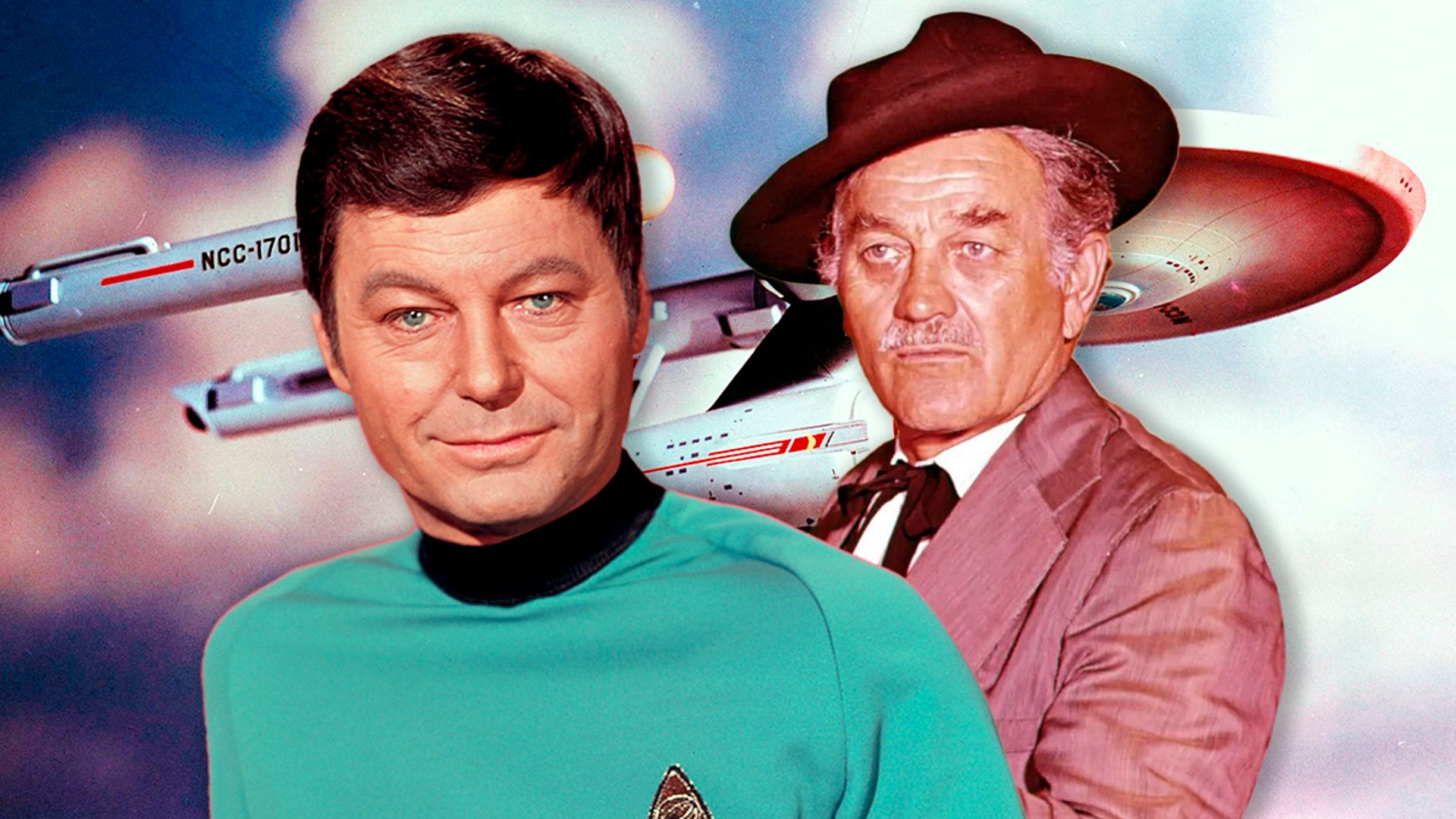
: Doc Adams from Gunsmoke was the inspiration for Star Trek‘s Doctor McCoy.
Westerns were incredibly popular on television in the late 1950s and early 1960s – so much so that aspiring TV writers, directors, and producers couldn’t avoid them. The genre was a huge part of the landscape, and for a time, even had its own dedicated Emmy Award. Even Rod Serling, who disliked Westerns (or at least how they were portrayed on TV), couldn’t escape their prevalence. They were simply everywhere.
It’s no surprise Gene Roddenberry, who first gained success writing for the popular Western series Have Gun…Will Travel, used Westerns to pitch Star Trek. Wagon Train, a successful show at the time, followed a group of wagons traveling across the country, led by a skilled leader who guided and protected them. Each episode focused on the people within a single wagon, allowing for a variety of stories. Roddenberry explained that Star Trek would follow a similar format: the starship Enterprise would travel the galaxy, with each week’s episode taking place on a different planet and featuring a new story based on that world.
It’s interesting how popular Westerns were at the time. They actually had an unexpected impact on Star Trek – DeForrest Kelley, who played Doctor McCoy, unconsciously began portraying the character with traits similar to Doc Adams from Gunsmoke. This wasn’t intentional, though – it wasn’t part of Gene Roddenberry’s original vision.
Who was Doc Adams on Gunsmoke?
Many popular stories rely on familiar character types – like the rebellious police officer, the loyal dog who’s a hero, or the thief who’s secretly good-hearted. These are common archetypes we see again and again. But it’s especially fascinating when a character isn’t just part of an archetype, but actually defines it, becoming the original model for others to follow.
Milburn Stone’s portrayal of Doc Adams on Gunsmoke is well-remembered, but the character actually originated on radio years earlier. While Stone became famous for the role, the original radio actor, Howard McNear, played Doc Adams quite differently. According to radio historian John Dunning, McNear’s Doc Adams was a rather selfish character, even seeming pleased when Marshal Matt Dillon killed someone because it meant more money for him through performing autopsies. He was also openly depicted as an alcoholic. Over time, though, the character did become more likable, as often happens with long-running characters.
Milburn Stone’s Doc Adams on Gunsmoke wasn’t your typical heroic doctor. He was a grumpy, often irritated man who disliked the constant violence he witnessed. He frequently complained to his friend, Marshal Dillon, about his difficult life. He was a lot like those wise but frustrating doctors you see on TV – and in fact, he’s the inspiration for many of them! Stone’s portrayal was so brilliant, he won an Emmy and played the role for the entire 20-season run of the show, though he did need to take some time off for health reasons, and Pat Hingle filled in temporarily.
Now, what Star Trek doctor does THAT sound like?
What has Gene Roddenberry said about McCoy and Adams?
Gene Roddenberry famously saw the character of Doctor McCoy on Star Trek as essentially representing… In a 1976 interview with Penthouse magazine, Roddenberry clarified this, stating:
The creators of Captain Kirk, Dr. McCoy, and Mr. Spock wanted to bring the internal thoughts of characters – something common in novels – to the screen. Novels allow readers to experience a character’s stream of consciousness – their inner debates and considerations. Since film can’t easily show this, the creators used the three characters to represent different perspectives in a dialogue. For example, Kirk might ask how to handle a threat, Spock would offer a logical solution, and McCoy would point out the human cost. This allowed them to have the same kind of internal debate you’d find within a single character’s thoughts in a novel, but expressed through conversation.
Gene Roddenberry based the character of Dr. McCoy on the famous satirist H.L. Mencken. Early Star Trek writers described McCoy as a direct descendant of Mencken – a remarkably outspoken and cynical character who wasn’t afraid to share his sharp observations about life.
Despite efforts to create a unique character, Dr. McCoy quickly began to resemble the Doc Adams character from Gunsmoke. This bothered Gene Roddenberry so much that he voiced his concerns to science fiction author Richard Matheson (known for I Am Legend) while Matheson was writing the script for the Star Trek episode, “The Enemy Within.” Roddenberry felt McCoy was being portrayed as too similar to the gruff doctor from Gunsmoke and wanted him to be more like the witty and critical writer H.L. Mencken instead.
Doc Adams was such a memorable character that he naturally influenced Doctor McCoy, despite Roddenberry’s intentions. Roddenberry didn’t mean for McCoy to be similar to Adams, but Adams’ impact was unavoidable.
So, the legend is…
STATUS: False
Want to hear more spooky stories about television? You can find a wider collection of urban legends here. For those interested in Star Trek tales, click here, and for Western-themed legends, click here.
Thanks to Frank for the great idea! If you have any suggestions for what we should cover next, please send them to brian@poprefs.com – I’d really love to hear them!
Read More
- Clash Royale Best Boss Bandit Champion decks
- Mobile Legends January 2026 Leaks: Upcoming new skins, heroes, events and more
- Vampire’s Fall 2 redeem codes and how to use them (June 2025)
- Clash Royale Furnace Evolution best decks guide
- Best Hero Card Decks in Clash Royale
- Mobile Legends: Bang Bang (MLBB) Sora Guide: Best Build, Emblem and Gameplay Tips
- Best Arena 9 Decks in Clast Royale
- Brawl Stars Steampunk Brawl Pass brings Steampunk Stu and Steampunk Gale skins, along with chromas
- Brawl Stars December 2025 Brawl Talk: Two New Brawlers, Buffie, Vault, New Skins, Game Modes, and more
- Clash Royale Witch Evolution best decks guide
2025-10-26 17:37